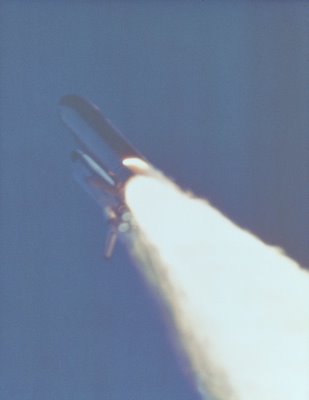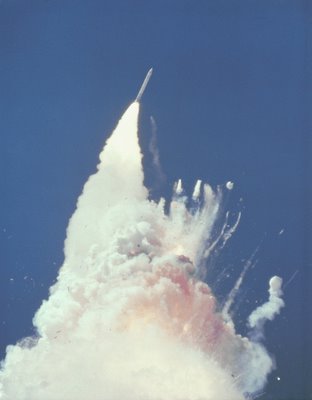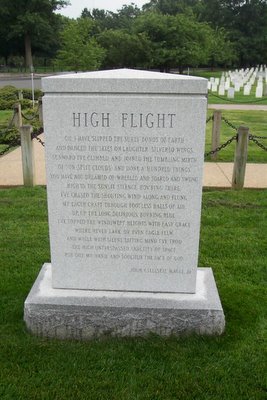20th Anniversary of the Challenger Shuttle Explosion...
I can't believe its been 20 years. I remember it as if it were yesterday. I was in school watching it on TV with my classmates; EVERYONE was in total SHOCK. The only other incident that has ever shocked me as much as this was the 9/11 terrorist attacks. Godspeed!

Tribute Video Tape that Aired on Channel 31 WAAY-TV, Huntsville, AL on Jan. 31, 1986. (right click "Save Target As" to download and save this video. It's a 20 mb .mpg video file) John Jenkins of WMJJ Radio in Birmingham edited some of President Ronald Reagan's eulogy into a song of John Denver called "On The Wings Of A Dream." The powerful music was then illustrated by Cliff Windham of Ch. 31 with video from ABC, NASA and WAAY-TV files to make this powerful TV tribute. It aired January 31, 1986 (courtesy of M.D. Smith, IV)
The Challenger shuttle crew, of seven astronauts--including the specialties of pilot, aerospace engineers, and scientists-- died tragically in the explosion of their spacecraft during the launch of STS-51-L from the Kennedy Space Center about 11:40 a.m., EST, on January 28, 1986. The explosion occurred 73 seconds into the flight as a result of a leak in one of two Solid Rocket Boosters that ignited the main liquid fuel tank. The crewmembers of the Challenger represented a cross-section of the American population in terms of race, gender, geography, background, and religion. The explosion became one of the most significant events of the 1980s, as billions around the world saw the accident on television and empathized with any one of the several crewmembers killed.






Ronald Reagan's Speech on the Space Shuttle Challenger Explosion (1986)
Ladies and Gentlemen, I'd planned to speak to you tonight to report on the state of the Union, but the events of earlier today have led me to change those plans. Today is a day for mourning and remembering. Nancy and I are pained to the core by the tragedy of the shuttle Challenger. We know we share this pain with all of the people of our country. This is truly a national loss.
Nineteen years ago, almost to the day, we lost three astronauts in a terrible accident on the ground. But we've never lost an astronaut in flight. We've never had a tragedy like this. And perhaps we've forgotten the courage it took for the crew of the shuttle. But they, the Challenger Seven, were aware of the dangers, but overcame them and did their jobs brilliantly. We mourn seven heroes: Michael Smith, Dick Scobee, Judith Resnik, Ronald McNair, Ellison Onizuka, Gregory Jarvis, and Christa McAuliffe. We mourn their loss as a nation together.
For the families of the seven, we cannot bear, as you do, the full impact of this tragedy. But we feel the loss, and we're thinking about you so very much. Your loved ones were daring and brave, and they had that special grace, that special spirit that says, "Give me a challenge, and I'll meet it with joy." They had a hunger to explore the universe and discover its truths. They wished to serve, and they did. They served all of us.
We've grown used to wonders in this century. It's hard to dazzle us. But for twenty-five years the United States space program has been doing just that. We've grown used to the idea of space, and, perhaps we forget that we've only just begun. We're still pioneers. They, the members of the Challenger crew, were pioneers.
And I want to say something to the schoolchildren of America who were watching the live coverage of the shuttle's take-off. I know it's hard to understand, but sometimes painful things like this happen. It's all part of the process of exploration and discovery. It's all part of taking a chance and expanding man's horizons. The future doesn't belong to the fainthearted; it belongs to the brave. The Challenger crew was pulling us into the future, and we'll continue to follow them.
I've always had great faith in and respect for our space program. And what happened today does nothing to diminish it. We don't hide our space program. We don't keep secrets and cover things up. We do it all up front and in public. That's the way freedom is, and we wouldn't change it for a minute.
We'll continue our quest in space. There will be more shuttle flights and more shuttle crews and, yes, more volunteers, more civilians, more teachers in space. Nothing ends here; our hopes and our journeys continue.
I want to add that I wish I could talk to every man and woman who works for NASA, or who worked on this mission and tell them: "Your dedication and professionalism have moved and impressed us for decades. And we know of your anguish. We share it."
There's a coincidence today. On this day three hundred and ninety years ago, the great explorer Sir Francis Drake died aboard ship off the coast of Panama. In his lifetime the great frontiers were the oceans, and a historian later said, "He lived by the sea, died on it, and was buried in it." Well, today, we can say of the Challenger crew: Their dedication was, like Drake's, complete.
The crew of the space shuttle Challenger honored us by the manner in which they lived their lives. We will never forget them, nor the last time we saw them, this morning, as they prepared for their journey and waved goodbye and "slipped the surly bonds of earth" to "touch the face of God."
Thank you.


The Shuttle Challenger Memorial ~~ Arlington National
Cemetery
At about 11:30 AM, Eastern Time, January 28, 1986, the Shuttle Challenger was launched from Cape Kennedy, Florida. Aboard the ship were its Commander, Francis R. "Dick" Scobee, its pilot, Michael J. Smith, and its crew, Christa McAuliffe (the first 'Teacher in Space'), Mission Specialists Ellison S. Onizuka, Judith A. Resnick and Ronald E. McNair, along with Payload Specialist Gregory B. Jarvis.
Seventy-three seconds into the mission, the Challenger exploded and fell into the sea. On April 29, 1986 the identified remains that had been located were turned over to their families for burial. However, there were number of unidentified remains. These remains were buried at Arlington National Cemetery on May 20, 1986, beneath the Memorial that appears below. Two of the crewmembers, Scobee and Smith, were buried in Arlington National Cemetery as well.



<< Home